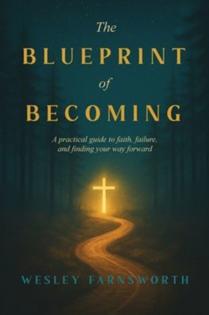Inspirational faith-fueled road map for real, lasting change
Published in Mom's Advice
We’ve all heard the phrase: You can’t change your stars. Wesley Farnsworth doesn’t argue with its sting — he remembers living under it. But his new book, "The Blueprint of Becoming: A Practical Guide to Faith, Failure, and Finding Your Way Forward," makes a persuasive case that the line is a lie we don’t have to keep believing.
With disarming candor and steady pastoral warmth, Farnsworth maps how he moved from secrecy and shame to purpose and service, then hands readers the tools to take their own first steps. The result is a book that functions as testimony, teacher and travel companion all at once.
Farnsworth organizes the journey with welcome clarity. Section One (“My Testimony”) is where he tells the truth the way people tell it when they’re finally done hiding. He writes about growing up in a ministry home, internalizing the pressure to be the “perfect kid,” and how people-pleasing led him into a private battle with pornography and anger.
His turning point comes through Celebrate Recovery and the slow, humbling decision to ask for help — first from God, then from other people. Farnsworth doesn’t sensationalize; he names the damage, the denial and the grace that met him when he admitted what he couldn’t fix alone.
That first section lands because the testimony isn’t presented as a victorious montage but as a lived process, the kind you recognize if you’ve ever tried to walk out of a dark room without pretending the lights were always on.
Section Two (“Biblical Perspectives”) pivots from personal narrative to the larger story of God’s people, tracing arcs of transformation that make Farnsworth’s recovery feel less like an outlier and more like a continuation of a very old pattern. We meet Saul becoming Paul, the prodigal returning home and leaders like Moses, Joseph and Esther who learn to trust divine timing and purpose.
Farnsworth doesn’t drop proof texts into the prose; he lets the biblical characters breathe, then draws gentle lines from their choices to ours. It’s an approach that reads less like a sermon and more like a conversation with a well-thumbed Bible open on the table between you.
Throughout, he returns to his central metaphor of “changing your stars,” expanding that image into a helpful framework: every life has “constellations” — relationships, career, health, spirituality — that illuminate our choices and reveal our priorities. The goal isn’t to pretend difficult stars don’t exist; it’s to let God realign them so the constellation tells a truer story.
Plenty of inspirational books fade as soon as you close the cover; this one gives you something to do. Section Three (“Beginning to Change”) is packed with practical helps — clear exercises for a time audit, strengths-and-weaknesses inventory, SMART goals and even a do-it-at-home SWOT analysis of a relationship.
Farnsworth places journaling prompts at the end of chapters and writes pastoral prayers that don’t feel canned. These are not add-ons; they are the spine of the practice the book invites. Readers finish a chapter with specific next steps and language for prayer when words feel thin.
The book also includes a Scripture index and a topical table that function like a mini concordance for readers working through grief, anxiety, forgiveness or identity. And Farnsworth’s recurring “Journaling Challenge” boxes make private reflection less intimidating; they ask concrete questions, invite honesty and consistently steer the reader toward action rather than rumination. Small groups and recovery ministries will find these sections plug-and-play ready.
Stylistically, Farnsworth writes like someone who has sat through enough late-night conversations to know when to push and when to encourage. The tone is humble and clear-eyed, free of performative guilt or triumphalism. When he references his own missteps, it’s not to shock or to score piety points; it’s to show that growth is possible and to name the tools that helped.
That approach keeps the pages turning. The language is plain-spoken and often vivid, and the pacing alternates between story, Scripture and step-by-step coaching so the reading experience never stalls.
Importantly, the book rarely confuses complexity with depth. Farnsworth doesn’t attempt an academic theology of addiction or a technical manual on behavior change. Instead, he gives you the handful of habits — truth-telling, accountability, prayer, Scripture meditation — that move the needle when practiced over time. This is a recovery-tinged, Scripture-saturated field guide meant to be used, not merely admired.
"The Blueprint of Becoming" succeeds because it never pretends that transformation is an event. It is a process — prayer, Scripture, community and courage practiced in small, repeatable ways — that gradually rewrites a life.
Farnsworth’s blend of vulnerability, biblical grounding and practical tools makes this a trustworthy companion for anyone intent on trading resignation for renewal. By the last pages, the book earns its promise: with God’s help, you can change your stars, and you don’t have to do it alone.
If you are carrying secret struggles and worrying that one confession will collapse your life, this book will feel like a hand on your shoulder. If you’re a ministry leader, counselor or small-group facilitator searching for a resource that anchors change in Scripture while keeping the language approachable, this belongs on your list. And if you’ve wondered whether the gap between the life you have and the life you were made for can really be crossed, Farnsworth’s answer is patient and hopeful: yes — one honest step, one realigned “star,” at a time.










Comments